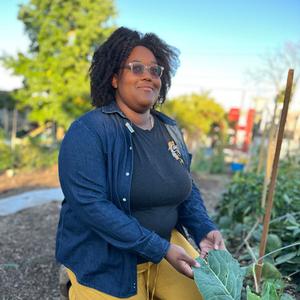
Welcome Back: Campus Leadership Qualities
As someone who's been in a multitude of campus leadership positions, I want to share some leadership qualities that might be helpful when preparing for the new school year.
By Justina Thompson — August 3, 2023

Qualities of a good leader, while having the same core principles such as communication, organization, and adaptability, may look different depending on the specific environment that one leads. Some college students may already be back on campus and in classes. For others, the big move-in week is on the way. For those in leadership positions, planning has been underway for quite some time, especially in preparation for welcoming a new class of first-year students to the campus! If you've played the role of resident assistant or student orientation advisor/ coordinator, you've likely already heard a staff person tell you that the first four to six weeks of a student's time on campus can really impact their transition into college life, especially in their first year at school. As someone who's been in a multitude of campus leadership positions, I want to share some leadership qualities that might be helpful when preparing for the new school year. Specifically, I offer ways to set up a supportive beginning to the school year for your peers.
Campus Leadership Qualities
The support of a college campus lies in the network that any individual student has across the campus itself. This network begins with the people connected in the dorms and through first-year classes, and only strengths as bonds are made with other staff and faculty members. With these bonds come other resources, such as suggested readings, networking events, referrals, and even a wiser presence in your sphere.
A resourceful campus leader will take this knowledge and connections within the campus system and delicately share its parts that resonate with new members of your community. Perhaps you have a great Chemistry mentor and a first-year student who is struggling and happens to have free time during this mentor's open office hours. On their own, the student could have been searching for that connection and resource for months but has a much stronger path to academic success towards the beginning of their college journey if that connection is made on behalf of a leader in close proximity. As a potential campus leader returning to school, what resources do you have that you'd want to share with your peers, and what are the signals you might look for to let you know it's the right time to share?
Transitioning into a new lifestyle aligned with school requirements can make folks vulnerable in their lives. Learning to trust new people, being in a new environment, and having more questions than answers, all compounded by the inevitable self-questioning of ability can create some pockets around our everyday armor. As leaders on campus, leaning into this vulnerability and reminding our peers of our full humanity can be a courageous way of making a safe space by example. No one is perfect, and when we can be open about the difficulties and mistakes in our journeys, especially when things may have been more bad than good, it reassures others that perfection is not the goal; balance is. Balance can also open the door to understanding the nuances and complexities of adulthood and the journey of growing into oneself. Connecting to the humanity and experiences of others personalizes the journey of growth to a new level and can disrupt the instinct to compare progress with others.
Most of the time, campus leaders step into their roles because, in addition to their connections and understanding of the greater campus, they have some desire to help and guide others through the school system. This empathy is essential to strong leadership, but navigating without the proper boundaries can also be tricky. Prioritizing self and community care will always support one's leadership capacity and help prevent harm and burnout from constant overpouring. Whether it's a time boundary where you focus on fun and restorative activities or scheduling a recurring decompression activity with friends, a care routine will restore your ability to show up for others. 'No.' Is a full sentence. When people challenge this notion, it can be easy to question. The hardest part about boundaries after communicating them can often be enforcing them. Take time to ground yourself in what makes you feel most seen, honored, and supported, and don't deviate from that to create capacity for others.
Reflecting on resourcefulness, vulnerability, and boundaries in leadership can give a strong and fresh perspective for starting the school year in support of your peers on the right note. What other leadership qualities might you reflect on to shape your year returning to school?
Two well-known campus leadership roles are Resident Assistant and Club Leadership (president, vice president, etc.). In that crucial period of the first four to six weeks of classes and time on campus, there are a few key ways to plan events and encourage engagements in ways that set up students for a supportive first year and greater college career. Here are a few examples to get the ball rolling for other specific ways to support your peers based on your campus culture!
Resident Assistants
A class tour the evening or two before classes is a great way to connect with first-year students and give them a tangible example of what positive support can look like on a new journey. Practically, this can also support visual reinforcement of the different academic buildings and how to reach their classes with the dorm as a starting point instead of a potential satellite admissions office. Getting this tour from another student gives room for the infusion of good study or relaxation spots in-between classes. The tour in this fashion can also help students grasp how long it may take to get from class to class! Navigating a new physical landscape can be overwhelming, but this introduction can make it easier.
In addition to this tour, gathering folks to do a brief schedule review can be great so that folks know other people in their classes! Especially since many first-year courses are general across majors, this can be a great way to connect with people you may not meet in major-specific spaces. This networking can be great if a student misses a class and needs notes, needs to know when a professor's office hours are or even has someone to walk with on the way to class! Study groups can also be a great way to socialize and support peers within the dorm space. Whether it's brainstorming through engineering homework together or reviewing concept flashcards, learning in a community can amplify success.
During the first week of class, if not on the first evening, coordinating a group meal in the closest dining hall can be an excellent way for peers in the same dorm to share experiences around their first days of classes and support building a healthy routine of decompression and eating! Getting caught up in the new responsibilities of a college lifestyle can easily leave students neglecting their basic needs, and reinforcing mealtime as an integral part of student life and campus routine can avoid some of those neglecting behaviors. It can also help to build those social support systems around mealtimes.
At the end of the first four to six crucial weeks of semester, making time for individual or group checking keeps folks accountable to themselves and the reality of the transition's nature. Encouraging folks to answer questions like "How are you finding balance?" And "Who are you learning through this transition?" can be great ways to gauge support and identify obstacles that students may be coming up against as they step into a new phase of life.
Club Leadership
As a club leader or executive board member, you can offer a unique set of resources to a new student on campus, specifically in the realm of networking outside of academics. Plan your early semester events in a few ways to welcome new faces and hopefully increase and retain membership! Starting with an introduction to leadership is a great thing. It lets others know who they can go to for what concerns and puts a face and personal name to a greater organization. Personal connections often keep folks engaged in an activity they may be fond of. Having events to get to know leadership but also to get to know the organizations, perhaps in 'Rush' fashion, makes spaces for newness a little less awkward and more normalized, which is helpful for the beginning of a semester.
While leadership shares its structures, operations, activities, and events with potentially new community members, this is also a great point of reflection on how to incorporate new things. Having regular opportunities for feedback, like meeting evaluations or an open suggestion box, can be a great way to get ideas from new members for events and activities and allows engagement and decision-making to be spread across all generations of a club's membership and not get stuck with the 'elders.'
This feedback may pair with a collaborative outreach and engagement plan, laying out how you will plan to share your organization with new people who may not have heard of it before. Advertising your club may include preparing for tabling, attending an activity fair, or even flying and sharing upcoming programming announcements on social media. One last addition which is great for integrating new students into your organization is implementing the role of freshman representative. A freshman representative is a great way to prioritize connecting with other first-year students (consider designating a similar role for transfer students) and give them an intentional decision-making role in your organization's leadership.
As a leader of an extracurricular club or activity, surely you hold some kind of knowledge and passion around the activity you're helping to lead! How might you intentionally prepare to share some of those best things through a welcoming environment with new people? That's the essence of 'back to school' or 'welcome to campus events. Hopefully, some of this planning and reflection on grounding leadership qualities set you up for a successful leadership term!

Justina Thompson
Justina "Farmer J" Thompson is the Farm Education and Volunteer Manager at Urban Creators, Philadelphia, PA. Justina intentionally attended school in Philadelphia so she could “connect her passion and experience to the ongoing environmental justice work in the area.” As a speaker, educational curriculum designer, program leader, and community organizer, Justina possesses extensive knowledge on urban farming inspired to work in the field of environmental justice from a young age.
What Extracurriculars Are Right for Your Ninth Grader?
May 16, 2024
Leveraging College Radio Stations: Unheard Stories from University Airwaves
August 2, 2023
